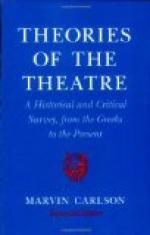Jeanne d’Arc was not a play; it was a narrative in verse, with lyric interludes. It was a thing to be read rather than to be acted. It was a charming poetic story, but it was not an interesting contribution to the stage. Most people felt this, I am sure; but most people lacked the courage of their feeling, and feared to confess that they were wearied by the piece, lest they should be suspected of lack of taste. I believe thoroughly in the possibility of poetic drama at the present day; but it must be drama first and foremost, and poetry only secondarily. Mr. Mackaye, like a great many other aspirants, began at the wrong end: he made his piece poetry first and foremost, and drama only incidentally. And I think that the only way to prepare the public for true poetic drama is to educate the public’s faith in its right to be bored in the theatre by poetry that is not dramatic. Performances of Pippa Passes and The Sunken Bell exert a very unpropitious influence upon the mood of the average theatre-goer. These poems are not plays; and the innocent spectator, being told that they are, is made to believe that poetic drama must be necessarily a soporific thing. And when this belief is once lodged in his uncritical mind, it is difficult to dispel it, even with a long course of Othello and Hamlet. Paolo and Francesca was a good poem, but a bad play; and its weakness as a play was not excusable by its beauty as a poem. Cyrano de Bergerac was a good play, first of all, and a good poem also; and even a public that fears to seem Philistine knew the difference instinctively.
Mme. Nazimova has been quoted as saying that she would never act a play in verse, because in speaking verse she could not be natural. But whether an actor may be natural or not depends entirely upon the kind of verse the author has given him to speak. Three kinds of blank verse are known in English literature,—lyric, narrative, and dramatic. By lyric blank verse I mean verse like that of Tennyson’s Tears, Idle Tears; by narrative, verse like that of Mr. Stephen Phillips’s Marpessa or Tennyson’s Idylls of the King; by dramatic, verse like that of the murder scene in Macbeth. The Elizabethan playwrights wrote all three kinds of blank verse, because their drama was a platform drama and admitted narrative and lyric as well as dramatic elements.




